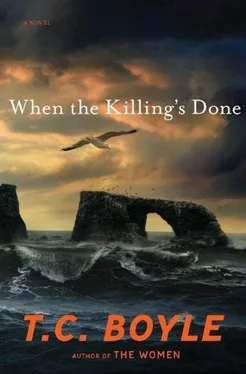She’d maneuvered herself between him and the seal, which was scrabbling at the rocks in a panic, but too weak to do much more than that, rising on its flippers and falling back again, and the man came to life in the flicker of that instant, thrusting his face in hers. “Who the fuck are you?” he demanded. He had a slim faded blue tattoo on the inside of his left wrist — a dolphin, leaping — and his breath smelled of tangerines, as if he’d just worked his way through a citrus grove.
It was an interesting question: who was she? It went to a point of authority — what gave her the right to interfere when he’d got there first and was only trying to do the obvious, flexing his muscles and his will for the benefit of his girlfriend and maybe his buddies and the crowd too, a true Samaritan motivated not by love of self but by love of all things? Even now, with a twinge of embarrassment, she remembers the answer she’d offered up: “I’m a scientist.”
Well, all right. At least she’d saved the animal, punching in the number of the Marine Mammal Center on her cell while the crowd stood back and the seal settled into its skin and the angular blades of its bones. Now, making her way toward the bluffs, the memory of the incident rises up and fades away again, because she’s spotted a pod of Risso’s dolphins — five, six of them — working the shoreline two hundred yards out. These are among the biggest of the dolphins, ten to twelve feet long and as much as eleven hundred pounds, normally a deepwater species but feeding in close this morning, and she takes their appearance as a rare treat. She’s walking briskly, trying to keep the animals in sight as they move toward the bluff, when she spots a figure up ahead, a man coming toward her with a pair of dogs. The dogs — airbrushed skulls, plunging pelvises, skin painted to bone — are greyhounds, she sees that now, and she’s thinking, Good for him, he’s rescued the animals from one of the racetracks in Florida , until she focuses on him and sees her mistake. There’s the set of the jaw, the wide shoulders and disproportionately long neck, something in his stride — but none of that gives him away. There are plenty of people, plenty of men, built like that, men who kick out their legs as if they’re trampling something or somebody with every step they take. No, it’s the dreads. Sand-colored dreads that fan out from his head as if he’s striding through a wind tunnel.
She feels a beat of panic. He’s seen her, she’s sure of it. Does she need an ugly confrontation now, this morning, when all she wants is a walk on the beach and a chance to savor the moment? She thinks to turn away, to walk in the opposite direction, retrace her steps — she can explore the reef anytime, tomorrow, the next day — when he calls out her name and she freezes. “Hey, Alma!” he shouts, the dogs fanning away from the bare struts of his legs like interceptors. “Alma Boyd! Alma Boyd Takesue!”
What she’s never told Tim — he never asked and he wouldn’t believe it anyway; she can barely believe it herself — is that once, for one disastrous truncated evening, she dated Dave LaJoy. Or had dinner with him. Or tried to. She’d met him at one of the music venues downtown, a coffeehouse that featured new young singer-songwriters. She was there alone one night — she was new in town, just weeks into the job she’d felt so lucky to get, six months away from meeting Tim — and here was this good-looking guy in his thirties sitting with another guy at the table next to hers. He was wearing a concert T-shirt with a likeness of Micah Stroud, guitar in hand, imprinted on the back of it, and that was an immediate plus in her eyes because in those days Micah Stroud was known only to those in the know. She liked his smile, the way he held himself, his hair — his hair made a statement. You didn’t see too many men his age in dreads. She figured him for a musician or an artist, maybe a writer, a photographer, someone independent anyway. “You look lonely over there,” he said. “Want to join us?”
And she did. And it went well. And when the weekend came he called and asked her to dinner, her choice, anyplace she wanted to go. She wasn’t really looking to get involved, not after Rayfield and her three years on Guam, where she’d got used to entertaining herself, and since she knew nothing about him except his own version — he owned some electronics stores, had done well, liked the outdoors, was currently unattached — she decided on a place she knew in the lower village. Pricey, but what wasn’t? The cuisine was nouveau Italian and she’d been there often enough, either alone or in the company of one of the girls from work, as to qualify as a regular. Often enough in any case to rate special treatment from Giancarlo, the owner and maitre d’, and to feel comfortable dining there, under his auspices, with a stranger. Who could turn out to be the love of her life. Or a disaster.
Things started out well enough. He showed up at her apartment on foot, with lilies from the flower girl — woman, actually — around the corner, and he made small talk while she put them in a vase, grabbed her black lace shawl and led him out the door. They walked up the street, across the bridge over the freeway, and into the lower village, the getting-acquainted banter running along smoothly — he had a house just up the hill, not more than half a mile away, and he went right by her place all the time, and how long had she been here? Three months? How had he missed her? He couldn’t believe it. She didn’t have a dog, he guessed, because if she’d had a dog he would have been sure to run into her on the bluff or the streets or beach. No, as he’d seen, she didn’t have a dog, though she loved dogs, but she was hardly settled yet and her business took her out to the islands a lot and dogs weren’t allowed there for fear they might spread disease to the resident foxes and skunks. The islands? he’d said. I love the islands .
Giancarlo greeted them at the door and showed them to a table by the window and then the waiter — Fredo, a tall saturnine Chileno who assumed the air and accent of a Neapolitan for the sake of authenticity — presented them with the wine list. “What do you prefer?” LaJoy had asked her. “Red or white?”
She shrugged. “I like red,” she said.
“Yeah,” he said. “Me too. But of course it depends on the dish. And the occasion.”
“Actually,” she confessed, “I’m not that much of a sophisticate. Three years on Guam’ll do that to you.” She gave a deprecatory laugh. “When you’re on Guam you drink what you can get. Sake , mostly. And whiskey. Or as they say, ‘Wheesky. Wheesky-soda.’ And gin, of course. G and T, the old reliable.”
He didn’t have much to say to this. His head was lowered to the wine list, the dreads falling forward to reveal the pink tessellations of scalp beneath. He was running a finger down the columns of offerings until finally he summoned Fredo. “Let me talk to the sommelier, will you?”
Fredo, funereally proper, stood over them, hands clasped behind his back. “I am afraid,” he pronounced, fighting his accent, “that we do not have a sommelier as such—”
“As such ?” LaJoy — Dave — was giving him a look of hostile disbelief. “What the hell is that supposed to mean? Do you or don’t you? Or are all the wines on this list ordered, cellared and poured by the tooth fairy?”
“I,” Fredo began, “or Giancarlo—”
“Get him over here.”
Fredo gave a small bow and vanished. While he was gone, LaJoy, gnawing a breadstick as if it were made of wood, lifted his eyes to her. “Amateurs,” he said. “I hate amateurs.”
She said his name then, slowly, reprovingly. “I’m sure they’ll do the best they can. This place — I don’t know if you’ve eaten here before — but this place is really topflight, as good as any restaurant in town.” She paused. “What were you looking for? Exactly, I mean?”
Читать дальше












